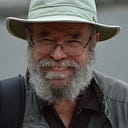Cairn
A Most Unusual Archaeologist
She brushed the rock wall. Bending forward she took a deep smell.
“Fox,” she thought.
Deeper, deeper. “The smell of winter, lots of winters.”
The lichen scent almost covered it, but her discernment pushed it aside. She was open-eyed, but not seeing. Scenting.
“Gunpowder. Very olde gunpowder.”
A chime. Her agent, annoying, necessary.
“Yes?”
“Your payment is in. Ten thousand, from the New England Archeology Trust.”
“NEAT” she replied.
There was silence for a moment. Then “Oh…”
Some just do not get wordplay, she thought.
“Thank you. There should be more soon, because I’m close. Must go.”
She returned to her search. There was the 19th century poem that was their only clue:
”By the rock wall,
by the filled-in well
there’s a cairn that marks
where the patriots fell.”
Bloodhounds, good but not great, had found the well’s remains. It was up to her to confirm this was where the battle happened, 270 years ago.
Smells like it, she thought. Saltpeter, charcoal, sulfur — lots of it. Firearms repelled her, but they were so much part of her work.
Now, the cairn … That was the contract, “Find the cairn.” Since the Convergence she had some rights. She had an agent, a sharp one too; but NEAT was famous for disputing on technicalities.
She walked to the center of the former field, now covered with second growth trees. Under the cold blue sky she signaled to the crew chief for silence. No one moved.
She took a deep breath, so she would not have her own respiration interfering. She raised one foot and stomped down, hard.
Echoes came back through the ground, confused by tree-roots but carrying the beginning of a pattern. She turned, and struck the earth again.
“There, there” she said when the resonances had died away. She circled it, striking the soil from time to time. She caught the crew chief’s attention and pointed at the mound of lowbush blueberry. “A knot of stones, 20 meters northeast. Irregular, partially buried. 80% chance that’s it.”
The crew chief had worked with her before. He nodded. He signaled his ground-radar crew forward. She reached out to her agent.
“I think we’ve got it. Please wait for confirming. Tell the NEAT folks the troops behind the wall used black powder with saltpeter from the Indies. That’s a freebee.”
The crew chief came up to her, stopping a respectful two meters away. He made a thumbs-up gesture, smiling in that simian way humans have. She reached out her trunk and touched his hand. She appreciated his courtesy.
She left the field and her driver took off her “African Elephant Archaeology Collaborative” tabard. She flicked her ears when he offered to remove the Talk from around her neck. He backed off. She climbed into her company’s truck.
As it started up she signaled her fellows scattered at sites around the world. “Archaeology is better than being hunted across the plains. Bless the Convergence. But I need some rest, and some elephant time.”
My thanks to Atlas Obscura for a story about New England stone walls, and to Microsoft’s Copilot AI for informing me that elephants have the best sense of smell among mammals. If you want to find how the Convergence began, you can read my novel Angels Unawares.
